- Home
- Alex Scarrow
No Escape Page 2
No Escape Read online
Page 2
He had orders.
Orders from Trent to make his way directly back to Cuba.
What remained of the Chinese navy’s high command might be steering the decision-making down there in New Zealand, but at least they didn’t have a swaggering idiot in charge of things. President Douglas Trent—once his best friend Dougie—was becoming a liability.
He could have announced they were joining the Pacific Nations ships but wondered how long his temporarily assigned authority would have lasted. It wouldn’t have been long before naval officers with sidearms relieved him of his role and steered them back on track toward Cuba—President Douglas Trent’s New United States.
While Tom was on his rescue mission, Trent had launched two tactical nukes just a few miles offshore from Havana, a little reminder of the Big Goddamn Stick he was carrying around with him. Two mile-high mushroom clouds of vaporized seawater, looming over the island like twin swords of Damocles, had been more than enough of a demonstration of Trent’s resolve for President Questra and the Partido Comunista de Cuba to submit to his strict terms.
Trent had used a couple of nukes to terrify the Cubans who were hosting the surviving Americans. He still had another few dozen to play around with.
That son of a bitch is a smoking firework, a chimp with a loaded machine gun.
If Tom found Grace and Leon aboard this ship today, he wouldn’t rule out commandeering a motorboat and racing after the Chinese, Australian, and New Zealand ships.
Better the devil you DON’T know…than a dangerous blowhard like Trent.
Chapter 3
“I am very, very disappointed, children.”
Grace felt her legs turning to jelly beneath her. Her stomach was churning. She was convinced she was going to give herself away by fainting. Or throwing up.
“Now this is something I don’t expect to see happening at Greenwich Elementary School. This is bullying of the worst kind.”
Everyone was in the main hall. Mrs. Baumgardner, the school principal, had her “angry spectacles” on—the ones with the thick black frames that made her look google eyed and terrifying. “I want whoever did this appalling thing to raise their hand.”
Grace did what everyone else was doing—she looked around.
“Come on. Nobody is going anywhere until I find out who did this!”
It hadn’t been bullying. Grace would have called it messing around maybe. Smearing jam around someone’s locker was hardly bullying.
“Come on!” snapped Mrs. Baumgardner. “This is your last chance to own up.”
Grace closed her eyes and slowly raised her hand. And the awful memory faded.
She opened her eyes, and Mrs. Baumgardner and the school were gone.
“Next!”
Grace’s eyes rested on the Chinese soldier in the biohazard suit. She could see his face through the acrylic plate of his helmet. No reassuring smile. He simply flexed his gloved fingers, beckoning her to step forward. Standing beside him was a young Australian midshipman in his navy uniform. She could see his gaze momentarily darting over the burn scars on the side of her face, then he offered her a nod.
“That’s right, it’s you next, sweetheart. Roll your sleeve up, love.”
Grace looked anxiously back at the people lining the bulkhead all the way down the Chinese carrier’s hangar deck. There were soldiers in yellow biohazard suits standing every couple of yards.
“Come on, we haven’t got all day, love,” said the Australian officer impatiently.
Grace stepped forward and peered through the open door. The room was a small storage hold that had been hastily repurposed into a clinical testing station. She stood in the doorway, one foot hesitantly perched on the hatch lip as she took it all in. They weren’t taking any chances here. One crewman was wearing a cumbersome flame-retardant suit and holding a fire extinguisher. Another was wearing the same and holding what looked like a flamethrower. There was a third in a yellow biohazard suit with a clear faceplate, holding a syringe in his thickly gloved hands.
“Go on,” said the Australian. “You’ll be fine.”
The process was intended to be quick and certain; no room for gray areas or ambiguities. No interviewing, no questions, no words exchanged, just a sample of blood taken and then tested for a reaction in a petri dish. If the blood didn’t coagulate, then fine.
But if it did…
The small room was empty of things that might catch fire, the bulkheads stripped back to plain metal panels. The consequence of a positive result would be resolved quickly.
“You next!” said the Chinese soldier beside the door.
“Stop pissing around, love,” urged the Australian. “We’ve got a lot to get through.”
“I’m scared,” she whispered.
“Nothing to be scared of.” The Australian officer wasn’t wearing a protective suit and, until now, had kept several paces back, letting his Chinese counterpart make contact. He stepped forward.
“No!” barked the Chinese soldier, intercepting him.
“Don’t touch me!” cried Grace.
He stopped and stepped back. “Yes, of course.”
“For your sake,” warned Grace. “Stay back.”
One of the men inside the testing station waved impatiently for her to step in.
“They just want to take a little of your blood, sweetheart. That’s all.”
“There’s…no need for that.”
“We have to test everyone again, love.” The Australian mimed an injection. “It’s just a quick little scratch, and then you’ll be done. All right?”
“No, really,” Grace said firmly now. “The test isn’t necessary.”
The Chinese soldier looked as though he’d had enough. “You go now!” He stepped forward to grab her.
“STOP!” she screamed, and raised her hands. Her voice echoed across the hangar. Civilians lined up on the far side of the hangar deck turned to look her way.
Grace turned to face the people who were behind her in the line. “All of you should step back.” She turned to the Australian officer. “You too.”
“What the hell are you playing at?” He was starting to sound wary.
“I’m infected,” she replied.
Her words had an instant effect. Both men drew back, the Chinese officer leveling his gun at her. The three men inside the testing station backed up; the one with the flamethrower stepped quickly around the tray table toward her. Behind Grace, the line recoiled as those who’d been standing nearest to her hurried backward.
Make it clear. Quickly!
She sat down on the lip of the doorway and folded her arms like a disgruntled toddler. “I am infected,” she repeated. “But I am not going to do anything!” She looked back over her shoulder. “Tell them quickly!”
The Australian barked a word or two in Mandarin. The flamethrower was leveled at her, and she guessed there was still a gun pointing at the back of her head.
“I am infected! But I’m here so we can talk!”
The five men stood frozen, like statues. A moment of stillness. Even the civilians just outside were perfectly still. No stampede. Not yet. A perfect bubble frozen in time, ready to burst into a screaming, flaming hell at any second. Grace raised her voice to ensure she was being heard. “I’m more than just infected,” she continued quietly. “I’m remade. I’m a viral manifestation. A human copy.” She turned her head slightly for the Australian officer’s benefit. “Tell them I’m here to help. Tell them I won’t move a muscle.”
He repeated her words in fractured Mandarin.
“Tell them I’m here on behalf of the virus.”
He translated her again.
Stay calm, Grace. Calm.
“I’m here to talk. To learn. To tell you about the virus—why it’s here, what it wants.”
As he repeated her
words, she could see the look of panic in all their eyes.
She knew the soldier holding the flamethrower was one command away from filling the doorway with flames. “If you try burning me, I’ll break up into those crabs! Hundreds of them!” She shot a glance at the Australian. He was standing there, dumbstruck and openmouthed. “Translate me!” she snapped.
He started doing so.
“Hundreds. And you won’t get them all. They’ll go after all of these people. You’ll have dozens infected within minutes. This ship will be overrun within an hour.”
The Australian was jabbering her words out in bad Mandarin, but she could see by the looks on their faces he was getting her point across. They’d all seen that happen firsthand; they knew she was right. They might be able to burn her…but possibly not all of her.
“Get your leader,” she said. “I need to talk to him.”
She waited for the officer to finish translating, hoping it would end with one of the Chinese soldiers pulling out a radio and talking into it.
But nothing. Everyone was still playing statues.
“NOW!” she screamed.
The soldier holding a gun slowly lowered it and pointed a shaking finger toward her. He muttered something.
“What did he just say?” asked Grace.
The Australian cleared his throat. “He…uh, he asked if you could move out of the way.”
“Why?”
“To, uh…to let him out? So he can go get the captain?”
She was sitting on the lip of the only doorway. “Right. Of course.”
She stood up and took several steps backward into the main hangar and watched as the silent crowd around her drew away to keep their distance.
The Chinese soldier stepped out of the testing station and edged away from her, finally, twenty feet away, turning and running.
“You…you’re not…going to—”
She looked up at Australian officer. “Erupt? No. I just want to talk.”
Chapter 4
“Don’t open it!” said Leon.
The banging on the delivery doors grew more insistent, both of them rattling in their frames under the heavy impact. Leon looked around at the others. His eyes settled on Cora—she was the one who’d assumed the role as their small group’s leader. He was looking at her, as were the others; if she wanted to lead, she’d better make the decision. And she looked like she was wavering, undecided.
Leon had his own opinion. “Don’t open it!” he said again. They’d been holed up in this building for four days, a small warehouse filled with cages of various sizes. Cages that contained the mummified corpses of animals, most too withered to be identifiable. This building had been the first one that they’d come across that was open and looked secure enough for Leon and the others to hide in as they’d fled the carnage down on the Southampton waterfront.
That awful night, order in the quarantine pen had descended into chaos in a matter of minutes. The few soldiers on guard had been quickly overrun, the chain-link fences woefully inadequate as the thousands of confined refugees had stampeded across the encampment, away from the viral outbreak that had begun to erupt around them.
God knows how many of them had secretly been virals. It was as if some agreed-on signal had triggered the infected people to make their move all at the same time. A few had spontaneously dissolved into the smaller scuttling creatures, others—in twos and threes—had merged into towering, nightmarish totem poles that had speared and clawed and lashed out at the fleeing crowd.
Panic had rippled across the thousands of incarcerated refugees, fences collapsing under the crush in a sky lit up by sweeping searchlights and flames.
A nightmare.
Leon had lost sight of Grace, lost his grasp on Freya’s hand. They’d vanished in the mayhem, caught up in the thick, riverlike press of bodies. Finally, he’d found himself with a dozen other people running for their lives, away from the screaming, the lights, the gunshots, the flames, the departing ships…
And this building was where they’d ended up, hurling themselves into the dark interior and jerking the doors closed behind them. Through that first night, they’d listened in petrified silence to the noises going on outside. Screaming voices begging to be let in, fists banging on the delivery door. Those bloodcurdling screams turning to whimpers of defeat, followed by the sound of receding footsteps as they gave up hope of getting in and looked for some other place to hide. Then later, the unbearable sound of insect-like legs scraping, checking, probing the perimeter of their building for weaknesses, for a way in. It was a sound that echoed and reverberated around the warehouse, merging to become white noise, like the rattling hiss of tropical rain spattering on a corrugated tin roof.
Every now and then, they heard the thump of something significantly larger testing the strength of the concrete walls, the boom and shaking of the doors as something heavy thrashed against them. Leon wondered if they were the same nightmare totem poles that had erupted in the containment pen—monsters two stories tall, staggering beasts that defied description. Creatures that constantly shifted form as they prowled around the outside of the building.
The second night had been quieter, except for the sound of a window breaking in the office above the warehouse. They went to check it out, finding broken glass and a brick on the floor. Someone—hopefully someone human—must have been trying to get in that way. Then came a banging on the delivery doors. Not something trying to break in, but someone trying to get them to open up.
Cora made a move as if she was going to respond to it. Leon grabbed her arm. “It can’t be human. Not now.”
The same something pounded against the loading dock doors and began begging to be let in.
“Please! Please! I know there’s someone in there! Please!”
They all sat still. No one daring to move.
“I saw your lights last night. I know someone’s in there. PLEASE!”
They kept quiet.
“It’s just two of us. Me and my little girl. Please just open. We’re not the virus!”
Leon looked around. Nobody seemed willing to look at anything other than their own feet.
“Just some water, then. Please! Just a sip for my little girl…”
“They can copy us,” hissed Leon. “Talk just like us.”
Whatever was out there continued like that for about ten minutes until suddenly the soft pleas became a frantic scream. “Ohmygod!”
They could hear the approaching sound of that insect-like hissing and tapping. It reminded Leon of the sound a wave makes as it draws back across a rocky beach.
The screaming stopped, and the last vaguely human sound they heard was a woman’s voice tearfully murmuring, “Don’t look, sweetheart, just don’t look—”
Then came the brief sound of screaming and thrashing. Leon didn’t need his imagination to know what was happening—he’d seen it happen too many times. Something large had just torn the woman and child to pieces. Brutally efficient.
At least it had been quick.
The third day and night were mercifully quiet—maybe too quiet. Leon had too much time to think. His mind replayed feverish snatches of the events in the containment pen, mixed with all the other moments of horror he’d experienced over the last two and a half years. Before the virus outbreak, the most grisly thing he’d experienced firsthand had been the bumpy skin stretched over a quarterback’s broken forearm.
He’d nearly barfed his guts up at the sight of it.
Since then…he’d seen too much: broken bodies, corpses reduced by the virus to festering pools of organic sludge, and, emerging from them, creatures large and small that defied all laws of nature.
He’d also seen what fear and paranoia could do to people—he’d witnessed his sister being set on fire because she hadn’t “looked right.”
His thoughts returned
to the chaos of three days ago. I escaped. Freya and Grace were with me most of the way to the pen’s exit. Right? They had to have made it outside too but must have gone in a different direction than him. He’d run toward the warehouses and storage containers; he could only hope the girls had run the other way. In which case, maybe they’d both managed to get on one of the rescue ships. It really didn’t matter whether they’d boarded the American or Chinese ships, as long as they’d survived.
The alternative wasn’t worth thinking about.
They escaped, MonkeyNuts. They got away.
He was happy to go along with that assurance.
OK, so now I can worry about me. We’re really going to die in here.
They had drinking water, lots of it, in large plastic drums, presumably a precautionary a supply for the animals that had once been kept here.
But no food.
This morning, he’d been looking out of the damaged corner window of the small upstairs office. Leon suspected there had to be tons of food sitting in the many warehouses nearby. They were in the middle of the freight-processing zone of a major international port. He was looking out at a labyrinth of flat, corrugated roofs. A few hundred yards away, he could see a vast towering landscape of shipping containers, with tall loaders looming over them.
Somewhere out there, there had to be food that was sitting in tin cans, so temptingly close, but given the gauntlet they’d have to run, it might as well have been on the other side of the English Channel.
The ground outside their building was crisscrossed with a dense latticework of viral threads and tendrils. Leon noticed they were concentrated around the doorways and loading docks of the various warehouses. He guessed they were there to act as trip wires or alarm sensors. Clearly the virus had sniffed out which of the nearby buildings contained people hiding away and was covering their points of exit.

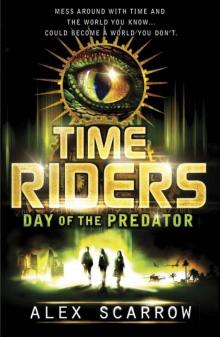 Day of the Predator
Day of the Predator Ellie Quin Book 3: Beneath the Neon Sky
Ellie Quin Book 3: Beneath the Neon Sky The Mayan Prophecy
The Mayan Prophecy October Skies
October Skies Ellie Quin Episode 4: Ellie Quin in WonderLand (The Ellie Quin Series)
Ellie Quin Episode 4: Ellie Quin in WonderLand (The Ellie Quin Series)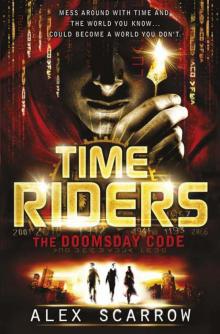 Time Riders
Time Riders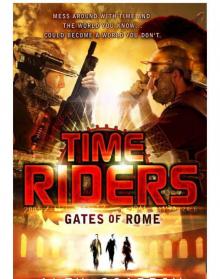 Gates of Rome
Gates of Rome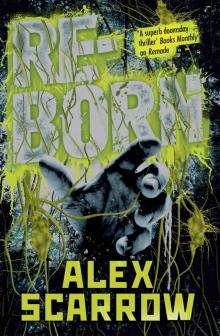 Reborn
Reborn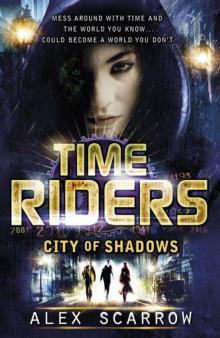 City of Shadows
City of Shadows Ellie Quin Book 2: The World According to Ellie Quin (The Ellie Quin Series)
Ellie Quin Book 2: The World According to Ellie Quin (The Ellie Quin Series) Ellie Quin Episode 5: A Girl Reborn
Ellie Quin Episode 5: A Girl Reborn Spore
Spore The Eternal War
The Eternal War Last Light
Last Light Remade
Remade Ellie Quin Book 2: The World According to Ellie Quin
Ellie Quin Book 2: The World According to Ellie Quin Ellie Quin Book 3: Beneath the Neon Sky (The Ellie Quin Series)
Ellie Quin Book 3: Beneath the Neon Sky (The Ellie Quin Series)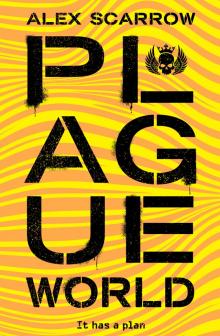 Plague World
Plague World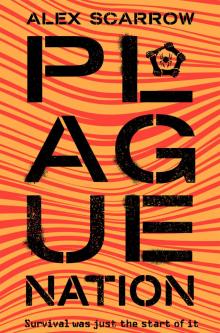 Plague Nation
Plague Nation Ellie Quin Book 01: The Legend of Ellie Quin
Ellie Quin Book 01: The Legend of Ellie Quin Ellie Quin - 04 - Ellie Quin in WonderLand
Ellie Quin - 04 - Ellie Quin in WonderLand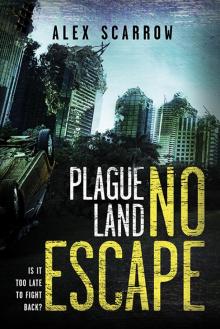 No Escape
No Escape TimeRiders
TimeRiders A Thousand Suns
A Thousand Suns The Candle Man
The Candle Man The Pirate Kings
The Pirate Kings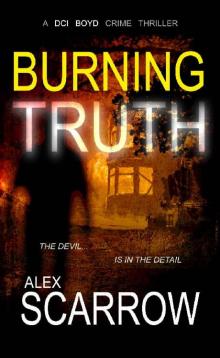 Burning Truth: An Edge-0f-The-Seat British Crime Thriller (DCI BOYD CRIME THRILLERS Book3) (DCI BOYD CRIME SERIES)
Burning Truth: An Edge-0f-The-Seat British Crime Thriller (DCI BOYD CRIME THRILLERS Book3) (DCI BOYD CRIME SERIES)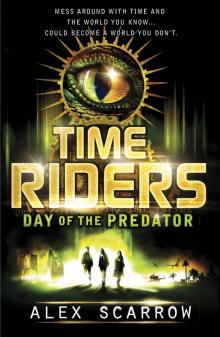 Day of the Predator tr-2
Day of the Predator tr-2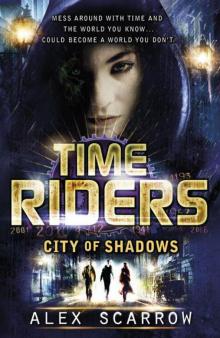 City of Shadows tr-6
City of Shadows tr-6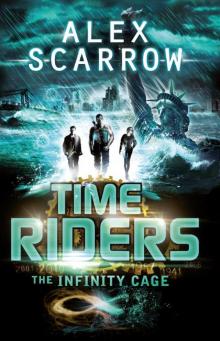 TimeRiders: The Infinity Cage (book 9)
TimeRiders: The Infinity Cage (book 9) The mayan prophecy (Timeriders # 8)
The mayan prophecy (Timeriders # 8)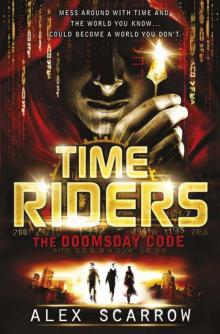 TimeRiders: The Doomsday Code (Book 3)
TimeRiders: The Doomsday Code (Book 3)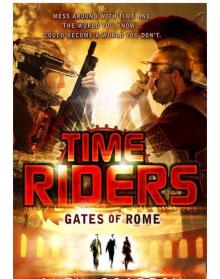 Gates of Rome tr-5
Gates of Rome tr-5 TimeRiders: The Pirate Kings (Book 7)
TimeRiders: The Pirate Kings (Book 7) TimeRiders: The Mayan Prophecy (Book 8)
TimeRiders: The Mayan Prophecy (Book 8)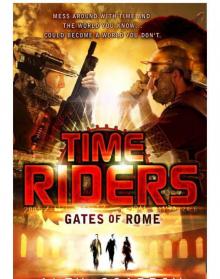 TimeRiders 05 - Gates of Rome
TimeRiders 05 - Gates of Rome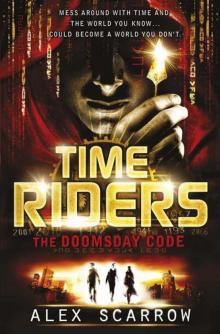 The Doomsday Code tr-3
The Doomsday Code tr-3 The Eternal War tr-4
The Eternal War tr-4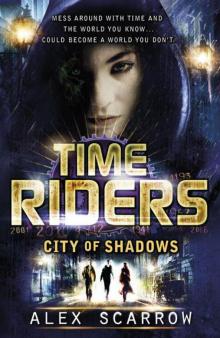 TimeRiders: City of Shadows (Book 6)
TimeRiders: City of Shadows (Book 6) Time Riders tr-1
Time Riders tr-1 Afterlight
Afterlight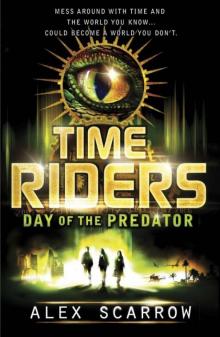 TimeRiders, Day of the Predator
TimeRiders, Day of the Predator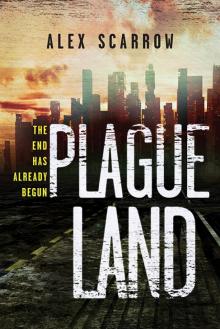 Plague Land Series, Book 1
Plague Land Series, Book 1